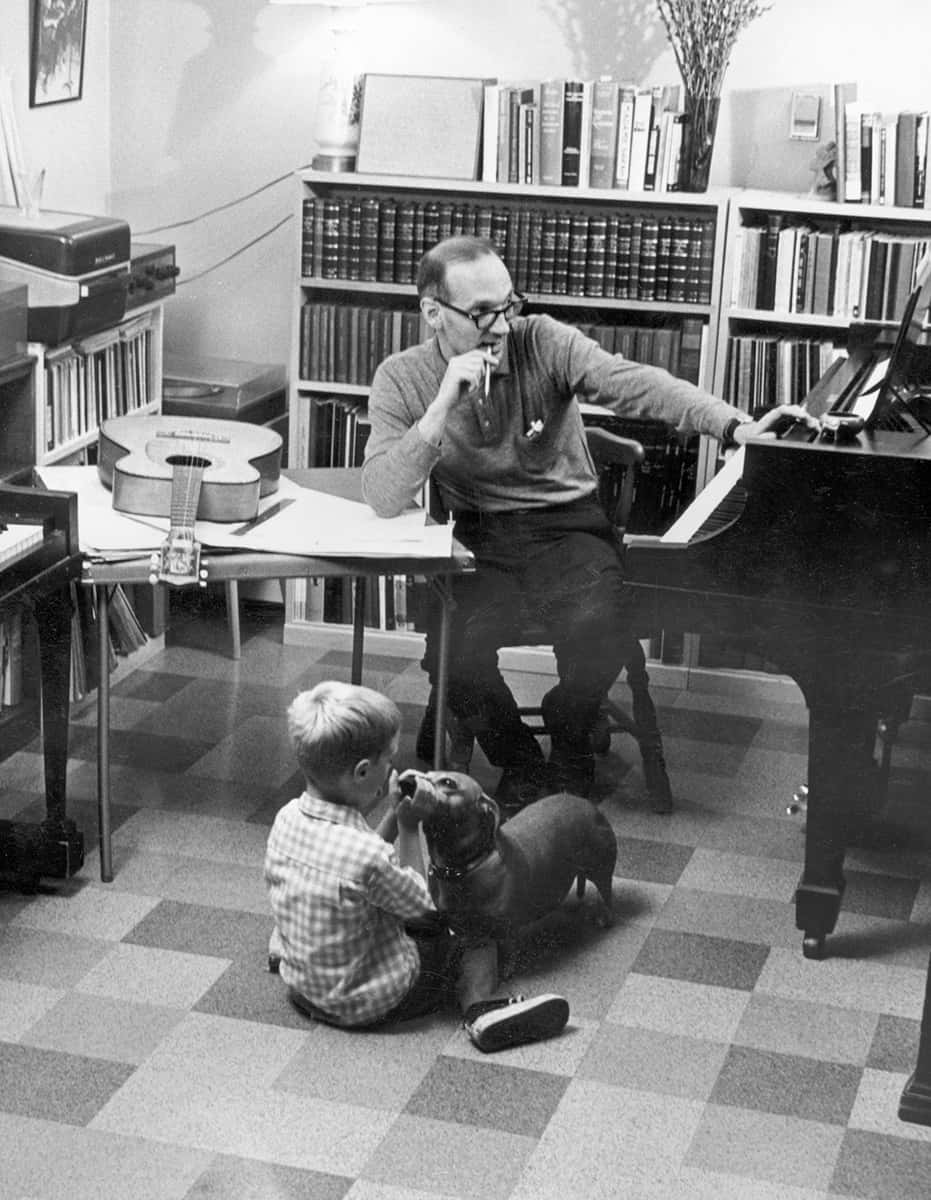George Crumb
George Crumb’s reputation as a composer of hauntingly beautiful scores has made him one of the most frequently performed composers in today’s musical world. From Los Angeles to Moscow, and from Scandinavia to South America, festivals devoted to the music of George Crumb have sprung up like wildflowers. Now approaching his 75th birthday year, Crumb, the winner of a 2001 Grammy Award and the 1968 Pulitzer Prize in Music, continues to compose new scores that enrich the musical lives of those who come in contact with his profoundly humanistic art.
George Henry Crumb was born in Charleston, West Virginia on 24 October 1929. He studied at the Mason College of Music in Charleston and received the Bachelor’s degree in 1950. Thereafter he studied for the Master’s degree at the University of Illinois, Champaign-Urbana under Eugene Weigel. He continued his studies under Boris Blacher at the Hochschule für Musik, Berlin from 1954-1955. He received the D.M.A. in 1959 from the University of Michigan, Ann Arbor after studying with Ross Lee Finney.
George Crumb’s early compositions include Three Early Songs (1947), for voice and piano; Sonata (1955) for solo violoncello; and Variazioni (1959) for orchestra-the composer’s doctoral thesis. In the 1960s and 1970s, George Crumb produced a series of highly influential pieces that were immediately taken up by soloists and ensembles throughout the world. Many of these were vocal works based on the poetry of Federico Garcia Lorca, including Ancient Voices of Children (1970); Madrigals, Books 1-4 (1965,69); Night of the Four Moons (1969); and Songs, Drones and Refrains of Death (1968). Other major works from this period include: Black Angels (1970), for electric string quartet; Vox Balaenae (1971), for electric flute, electric cello and amplified piano; Makrokosmos, Volumes 1 and 2 (1972, 73) for amplified piano; Music for a Summer Evening (1974) for two amplified pianos and percussion; and Crumb’s largest score – Star-Child (1977), for soprano, solo trombone, antiphonal children’s voices, male speaking choir, bell ringers and large orchestra. George Crumb’s most recent works include Eine Kleine Mitternachtmusik for solo piano (2001), Otherworldly Resonances for two pianos (2002) and a four-part song cycle, American Songbook (The River of Life, A Journey Beyond Time, Unto the Hills, The Winds of Destiny) (2001-2004).
George Crumb’s music often juxtaposes contrasting musical styles. The references range from music of the western art-music tradition, to hymns and folk music, to non-Western musics. Many of Crumb’s works include programmatic, symbolic, mystical and theatrical elements, which are ftlineoften reflected in his beautiful and meticulously notated scores. A shy, yet warmly eloquent personality, Crumb retired from his teaching position at the University of Pennsylvania after more than 30 years of service.
Awarded honorary doctorates by numerous universities and the recipient of dozens of awards and prizes, Crumb makes his home in Pennsylvania, in the same house where he and his wife of more than 50 years raised their three children. George Crumb’s music is published by C.F. Peters and the ongoing series of “Complete Crumb” recordings, supervised by the composer, is being issued on Bridge Records.
George Crumb is the recipient of numerous awards:
- Elizabeth Croft fellowship for study, Berkshire Music Centre, 1955.
- Fulbright Scholarship, 1955-6.
- BMI student award, 1956.
- Rockefeller grant, 1964.
- National Institute of Arts and Letters grant, 1967.
- Guggenheim grant, 1967, 1973.
- Pulitzer Prize (for Echoes of Time and the River), 1968.
- UNESCO International Rostrum of Composers Award, 1971.
- Koussevitzky Recording Award, 1971.
- Fromm grant, 1973.
- Member, National Institute of Arts and Letters, 1975.
- Ford grant, 1976.
- Prince Pierre de Monaco Gold Medal, 1989.
- Brandeis University Creative Arts Award.
- Honorary member, Deutsche Akademie der Kunste.
- Honorary member, International Cultural Society of Korea.
- 6 honorary degrees.
- 1998 Cannes Classical Award: Best CD of a Living Composer (BRIDGE 9069)
- 2001 Grammy for Best Contemporary Composition (Star-Child)
- 2004 Musical American “Composer of the Year”
George Crumb on Mode:
Black Angels and Makrokosmos 3 (mode 170)
Celestial Mechanics - Pianoduo Degenhardt/Kent (mode 19)
Makrokosmos Books 1 and 2 (mode 142)
Metamorphoses (Book I); Five Pieces for Piano — Margaret Leng Tan (mode 303)
Zeitgeist - Pianduo Degenhardt/Kent (mode 19)
Margaret Leng Tan: Sonic Encounters (mode 15)
George Crumb Online

